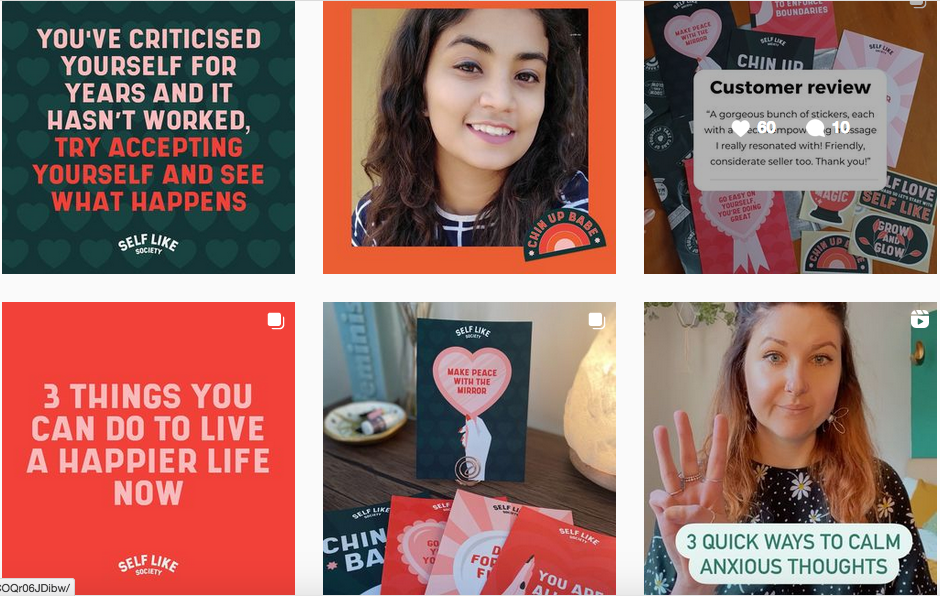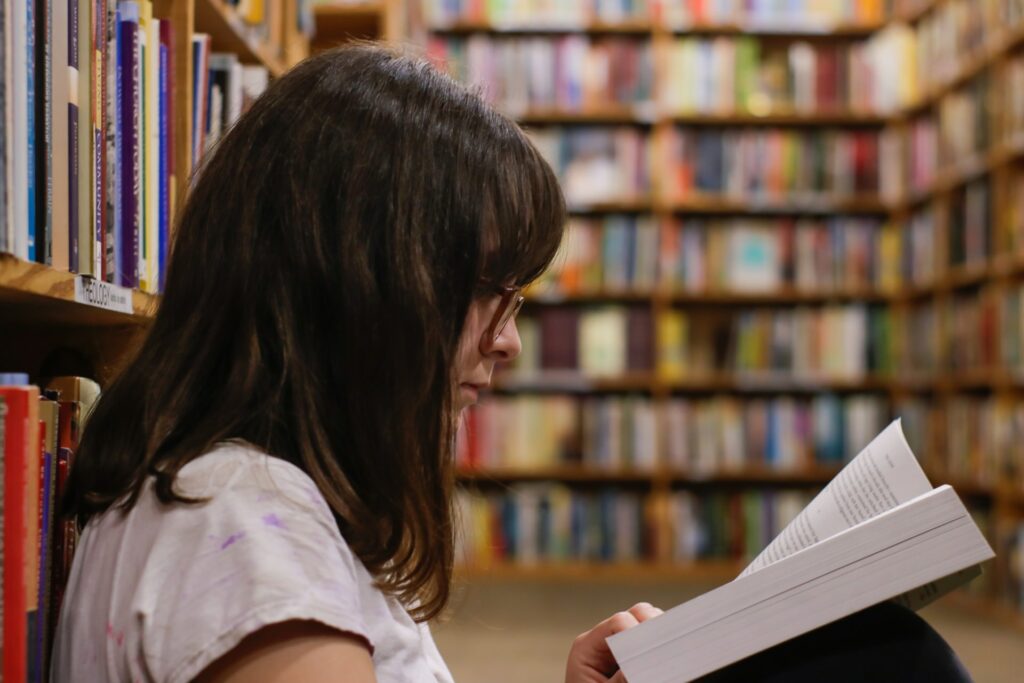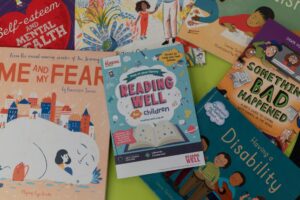(CONTENT WARNING: Mention of mental illness, depression and anxiety)
As we near the start of Mental Health Awareness Week, it’s a good time to ponder can reading improve mental health? The pandemic has taken a toll on us all, so you won’t be surprised to read that young people’s mental health has suffered a lot over the last 12 months, with cases of anxiety and depression at an all-time high. According to NHS research, one in six young people now have a mental health problem, with girls and young women more likely to suffer from poor mental health than their male counterparts.
Of course, this is nothing new; lockdown has simply exacerbated an existing problem. Sadly, it has taken a global pandemic to shine a light on the extent of the issue and encourage society to do something about it.
The government plans to inject a significant amount of cash into improving mental health resources for young people – including increasing the number of mental health support teams in schools and colleges from 59 to 400 by 2023. This is good news, but there are also things young people can do to take back control of their well being. One answer might come from an unlikely source…
Social media – a surprising mental health remedy
We’re all aware of the potentially harmful effects of social media; it receives constant coverage in the press. We are persistently warned to limit the time spent on our phones to protect our mental well being. Having suffered from poor mental health since I was a teenager (but only receiving an accurate diagnosis of anxiety and depression in my mid-twenties), anything offering insights into a link between social media and deteriorating mental health resonates with me.
But, as I write this piece on can reading improve mental health during my thirtieth year, I am happy to say that I am in a good, stable place mentally. Lockdown has been testing, that’s for sure, but by maintaining positive practices (a structured routine, regular exercise and lots of puppy cuddles), I have remained resilient throughout a tough year. The other thing that has helped me avoid plunging into an anxiety spiral is Instagram.
Yes, Instagram bombards us with bogus, celebrity-endorsed nonsense; yes, comparisons with others who seem to be in a better place can steal our joy; but I – like a lot of other users – have decided to use social media to my advantage and started a mental health-focussed Instagram account during a particularly tough period in my life.
In 2019, I was signed off work with depression and anxiety and faced the daunting prospect of months without a routine while I was expected to ‘get better’. My GP and occupational health team supported my journey to wellness through access to medication and talking therapy, but I knew that I had to do something for myself to make the journey a little bit easier.
I set up a separate Instagram account from my personal one, where I began sharing positive and empowering quotes at the start of every day. There was no hashtag strategy or engagement goal; the purpose was purely to give me a reason to get out of bed every morning.

Sharing stories to support mental wellness
As I began to heal, I continued to use the account to share my story. Pretty soon, I was connecting with people across the world who had gone through similar experiences. I had found a community of like-minded individuals who aspired to lift each other up and provide positive content for us to read.
Last year, finding myself with a surplus of free hours in the day, I launched an accompanying website and rebranded the account Self Like Society. For many, the concept of ‘self-love’ is a daunting, unattainable goal. Instead, I encourage my readers to focus on learning to ‘like’ themselves more.
A key part of my account is sharing the stories of other young women. I have been privileged to speak with women from around the globe, of different races, occupations and socio-economic backgrounds, all connected by the common thread of struggling with mental health.
By telling their stories and documenting their meandering journeys of reaching a place of self-like, they assure anyone reading it that they are not alone. For my members and me, harnessing the power of social media has been a cathartic and positive experience. Sharing stories has always been key to our individual development and society. Before we had printed books, we passed on stories orally to help us feel connected to each other and to preserve our history. I aim to do similar through my account, albeit in a more modern way!
As well as managing the Self Like Society Instagram account, I run one called Girls Who Read that documents the books my friends and I are reading. It has allowed us to continue our discussions about books while being physically apart, but (perhaps, more importantly) we are, once again, benefitting from sharing stories. We came together through the stories we are reading and stayed connected through our mutual love of books.
Reading ourselves well
Along with the bonding experience that comes from discussing books with friends, books play another vital role that has come to the fore during lockdown. While we’ve all been stuck in the same place for months on end, they have provided us a way to experience life through another set of eyes, travel to unknown places and, albeit temporarily, leave the monotony of our daily lives. Books provide escapism, even when we cannot leave our own four walls.
Unsurprisingly then, a recent survey of Brits ranked reading the second most popular hobby taken up during lockdown, due to its calming effect . A report by Renaissance Learning, focussed specifically on young people, found that children read longer books of greater difficulty during lockdown periods last year, and said that reading made them feel better while isolated from the wider world. Meanwhile, Northumberland Libraries have been awarded £10,000 from The Reading Agency through its new campaign Read, Talk, Share to help combat loneliness and promote well being through the power of reading.

Getting lost in your imagination is a great sanctuary when the world outside is a bleak and stressful place. It can also be a way for younger people to understand and deal with their own mental well-being issues. By reading about a character experiencing the same problems and feeling the same way as them, a child struggling with their emotions can start to process what they are going through and, most importantly, know that they are not alone.
Wellness books written for younger audiences can help those experiencing mental health issues to understand their conditions better and discover techniques to help manage them. The Reading Well children’s book list contains 33 books covering topics relevant to today’s young people, including grief, anxiety and bullying. The books on the list have been carefully selected to help younger children (aged 7-11) understand and talk about their mental health and well-being. Choices include What’s Going On Inside My Head? by Molly Potter and Me And My Fear by Francesca Sanna.
Mental wellness conversations need to happen with the young people in our lives pre-emptively and long before any risk of reaching rock bottom. By understanding that they have mental health, children can learn that they need to work on it and look after it in the same way they do their physical health.

So, how far can reading improve mental health? A great deal! Therefore, it is imperative that every child has access to books that support their mental well-being and educational development. Reading is fun and enjoyment of books is essential, especially for younger children, but there might be times in the life of a child when they could benefit from reading books where a happy ending isn’t determined by the beginning. Having a rough time in life doesn’t mean there won’t be a happily ever after.
Thank you for visiting our blog. Our vision here at Books2All is a world where every child finds the books that help them reach their true potential. If you have spare books in good condition at home that you think might be appropriate for school children, please sign up for our app’s pre-release waiting list. If you represent a school, please register to receive books for your students.

